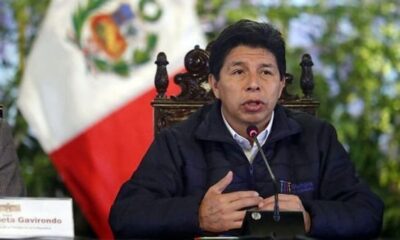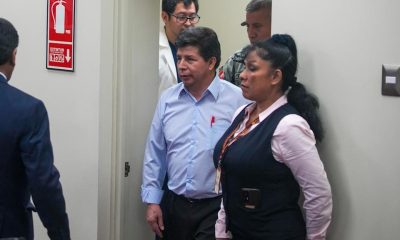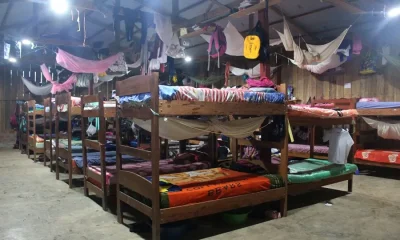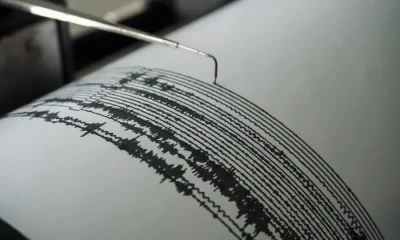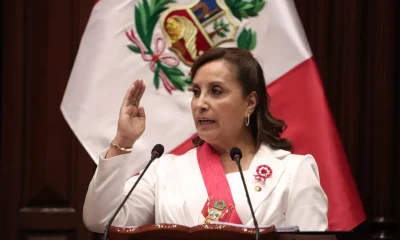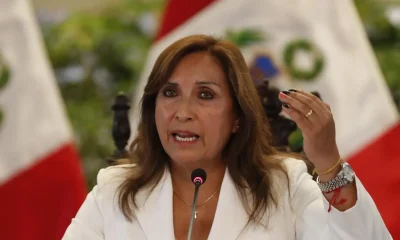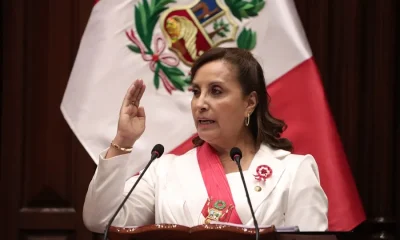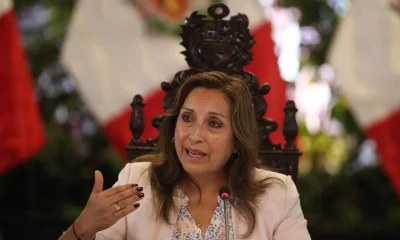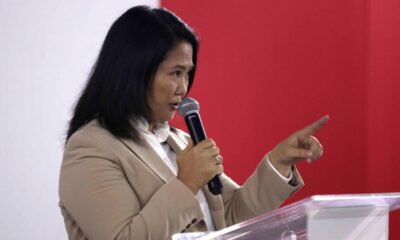International
Peru declares state of emergency as ousted leader remains in prison
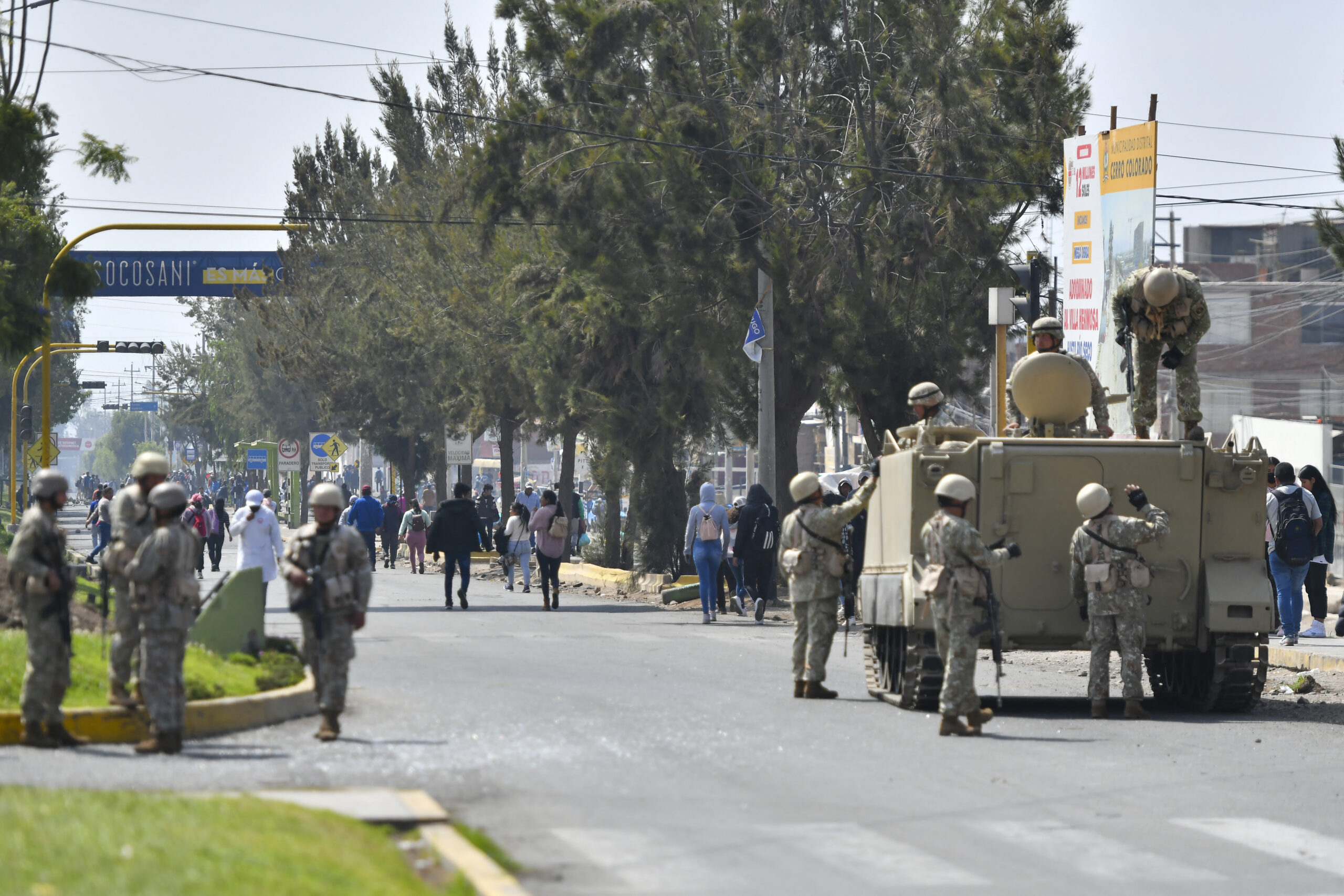
| By AFP | Luis Jaime Cisneros and Patrick Fort |
Peru declared a nationwide state of emergency Wednesday amid violent protests against the ouster of ex-president Pedro Castillo that have left seven people dead.
The announcement came as a judge ordered Castillo to remain in prison, on charges of rebellion and conspiracy for another 48 hours ahead of a release hearing.
Castillo’s arrest last week after he tried to dissolve congress and rule by decree has sparked days of nationwide protests that quickly escalated into violence.
Defense Minister Alberto Otarola announced the new 30-day state of emergency due to “acts of vandalism and violence, road blocks.”
He said the measure involved “the suspension of the freedom of movement and assembly” and could also include a night-time curfew.
The new president, Dina Boluarte, again moved to ease tensions by calling for elections to be brought forward, this time to December 2023.
On Sunday, Boluarte had already said she would seek to advance elections from 2026 to 2024 but that did not appease Castillo supporters demanding his release and elections now.
Last week, a judge ordered Castillo to be held for seven days, and he was meant to be released on Wednesday.
However, prosecutors filed a request late on Tuesday to hold him in pre-trial detention for 18 months.
Judge Juan Checkley on Wednesday postponed a hearing on the new request until Thursday after defense attorneys argued they had not received all documents from the public prosecutor.
He also ordered Castillo to remain in detention for another 48 hours.
Castillo, a leftist former school teacher, was in power for only 17 months in the South American nation that is prone to political instability and is now on its sixth president in six years.
His short period in office was marked by a power struggle with the opposition-dominated Congress, and six investigations into him and his family mainly for corruption.
‘Serious social convulsion’
Castillo was facing his third impeachment bid when, last Wednesday, he announced he was dissolving Congress and would rule by decree.
But lawmakers went ahead and voted to sack him and he was quickly arrested while trying to flee to the Mexican Embassy and seek asylum.
Boluarte, who was Castillo’s vice president, was sworn in as his successor.
Her attempts to calm tensions have failed, including an earlier state of emergency in several flashpoint regions.
Boluarte has now twice proposed advancing elections.
“Legally it works for April 2024 but by making some adjustments we can bring them forward to December 2023,” she told reporters.
Rights ombudsman Eliana Revollar told AFP on Tuesday that things could still get worse.
“This is a very serious social convulsion. We fear that it will lead to an uprising because there are people calling for an insurrection, who are asking to take up arms,” said Revollar.
Five people were killed in clashes between protesters and security forces on Monday following another two on Sunday.
Six of the seven deaths have been in the Apurimac region, where Boluarte was born.
‘I will never give up’
Castillo also appeared in court on Tuesday by video link as he appealed his initial seven-day detention.
He called his arrest unjust and arbitrary and said he would “never give up and abandon this popular cause that brought me here.”
He also called on security forces “to lay down their arms and stop killing these people thirsty for justice.”
Protests by Castillo supporters began almost immediately after his arrest.
Mexico’s leftist President Andres Manuel Lopez Obrador, who said his country still recognizes Castillo as president, has joined other regional leftist leaders in pledging support for the ousted leader.
Protesters have set up road blocks in numerous regions.
The worst-hit areas are in the north and south, including the region of Cusco, a tourism lure that is home to the Machu Picchu Inca citadel, and Peru’s second city, Arequipa.
In Lima, dozens of demonstrators threw stones at the police on Tuesday evening as they tried to reach Congress, with the police firing tear gas to disperse them.
Indigenous and agrarian organizations called an indefinite strike to begin on Tuesday, forcing the train service between the city of Cusco and Machu Picchu to be suspended.
International
U.S. Senate Rejects Budget, Bringing Government Closer to Shutdown Amid DHS Dispute

The U.S. Senate voted on Thursday against a budget proposal in a move aimed at pressuring changes at the Department of Homeland Security (DHS), following the killing of two civilians during a deployment of immigration agents in Minneapolis.
All Senate Democrats and seven Republican lawmakers voted against the bill, which requires 60 votes to advance, pushing the country closer to a partial government shutdown that would cut funding for several agencies, including the Pentagon and the Department of Health.
The rejection came as Senate leaders and the White House continue negotiations on a separate funding package for DHS that would allow reforms to the agency. Proposed measures include banning Immigration and Customs Enforcement (ICE) agents from wearing face coverings and requiring them to use body-worn cameras during operations.
The vote took place just hours after President Donald Trump said he was “close” to reaching an agreement with Democrats and did not believe the federal government would face another shutdown, following last year’s record stoppage.
“I don’t think the Democrats want a shutdown either, so we’ll work in a bipartisan way to avoid it. Hopefully, there will be no government shutdown. We’re working on that right now,” Trump said during a Cabinet meeting at the White House.
International
Trump Says Putin Agreed to One-Week Halt in Attacks on Ukraine Amid Extreme Cold

U.S. President Donald Trump said on Thursday that he secured a commitment from Russian President Vladimir Putinto halt attacks against Ukraine for one week, citing extreme weather conditions affecting the region.
“Because of the extreme cold (…) I personally asked Putin not to attack Kyiv or other cities and towns for a week. And he agreed. He was very pleasant,” Trump said during a Cabinet meeting broadcast by the White House.
Trump acknowledged that several advisers had questioned the decision to make the call.
“A lot of people told me not to waste the call because they wouldn’t agree. And he accepted. And we’re very happy they did, because they don’t need missiles hitting their towns and cities,” the president said.
According to Trump, Ukrainian authorities reacted with surprise to the announcement but welcomed the possibility of a temporary ceasefire.
“It’s extraordinarily cold, record cold (…) They say they’ve never experienced cold like this,” he added.
Ukrainian President Volodymyr Zelensky later commented on the announcement, expressing hope that the agreement would be honored.
International
Storm Kristin Kills Five in Portugal, Leaves Nearly 500,000 Without Power

Storm Kristin, which battered Portugal with heavy rain and strong winds early Wednesday, has left at least five people dead, while nearly half a million residents remained without electricity as of Thursday, according to updated figures from authorities.
The revised death toll was confirmed to AFP by a spokesperson for the National Emergency and Civil Protection Authority (ANPEC). On Wednesday, the agency had reported four fatalities.
Meanwhile, E-Redes, the country’s electricity distribution network operator, said that around 450,000 customers were still without power, particularly in central Portugal.
Emergency services responded to approximately 1,500 incidents between midnight and 8:00 a.m. local time on Wednesday, as the storm caused widespread disruptions.
The Portuguese government described Kristin as an “extreme weather event” that inflicted significant damage across several regions of the country. At the height of the storm, as many as 850,000 households and institutions lost electricity during the early hours of Wednesday.
Several municipalities ordered the closure of schools, many of which remained shut on Thursday due to ongoing adverse conditions.
Ricardo Costa, regional deputy commander of the Leiria Fire Brigade, said residents continue to seek assistance as rainfall persists.
“Even though the rain is not extremely intense, it is causing extensive damage to homes,” he noted.
In Figueira da Foz, a coastal city in central Portugal, strong winds toppled a giant Ferris wheel, underscoring the severity of the storm.
-

 Central America5 days ago
Central America5 days agoGuatemala Police Arrest Prison Guard Caught in the Act of Extortion
-

 Central America5 days ago
Central America5 days agoHonduras swears in conservative president Asfura after disputed election
-

 Central America5 days ago
Central America5 days agoBukele leads public trust rankings as UCA survey highlights gains in security
-

 International3 days ago
International3 days agoFootball Fan Killed in Clashes After Colombian League Match
-

 Central America3 days ago
Central America3 days agoGuatemala President Says Starlink Terminal Found Inside Prison
-

 International5 days ago
International5 days agoDoomsday clock moves to 85 seconds before midnight amid rising global risks
-

 International5 days ago
International5 days agoWinter Storm Fern Leaves 30 Dead and Over One Million Without Power Across the U.S.
-

 International2 days ago
International2 days agoU.S. Senate Rejects Budget, Bringing Government Closer to Shutdown Amid DHS Dispute
-

 Sin categoría5 days ago
Sin categoría5 days agoEight Killed in Series of Armed Attacks in Ecuador’s Manabí Province
-

 International5 days ago
International5 days agoSpain approves plan to regularize up to 500,000 migrants in Historic Shift
-

 International3 days ago
International3 days agoMissing Spanish Sailor Rescued After 11 Days Adrift in Mediterranean
-

 Sin categoría5 days ago
Sin categoría5 days agoEl Salvador Launches Fourth Year of Ocean Mission to Protect Marine Ecosystems
-

 International3 days ago
International3 days agoRubio Says U.S. Could Participate in Follow-Up Russia-Ukraine Talks
-

 Central America1 day ago
Central America1 day agoPanama Supreme Court Strikes Down Panama Ports Concession as Unconstitutional
-

 International2 days ago
International2 days agoStorm Kristin Kills Five in Portugal, Leaves Nearly 500,000 Without Power
-

 Central America1 day ago
Central America1 day agoU.S. and Guatemala Sign Trade Deal Granting Zero Tariffs to Most Exports
-

 International2 days ago
International2 days agoTrump Says Putin Agreed to One-Week Halt in Attacks on Ukraine Amid Extreme Cold
-

 International2 days ago
International2 days agoMan Arrested After Vehicle Crashes Into Jewish Institution in Brooklyn

























